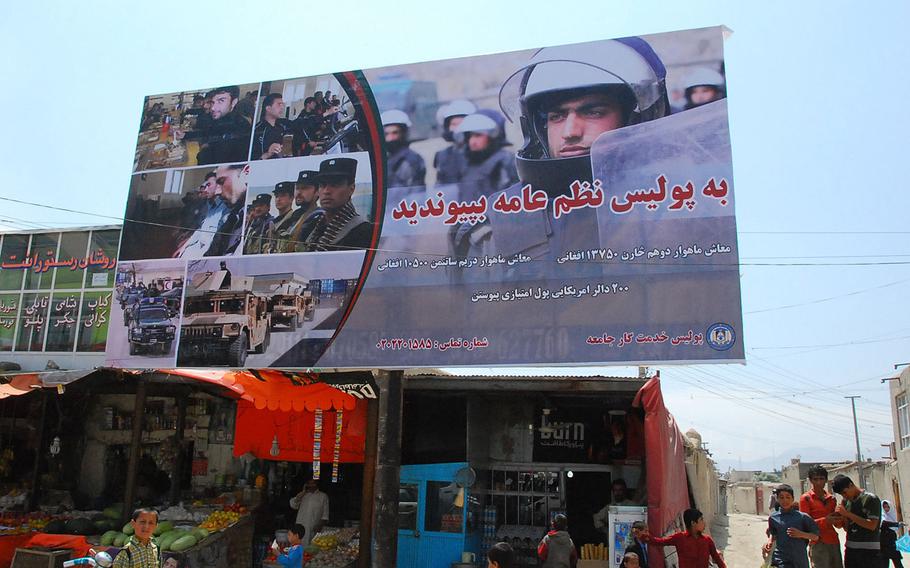
An Afghan national civil order police recruiting billboard in Kabul, Afghanistan in 2010. The Leonie Group, which produced television, radio and billboard ads in Afghanistan, billed the government for ads that were never disseminated, the company's former president alleges in a whistleblower lawsuit. ()
An information operations contractor billed the Pentagon millions of dollars for pro-U.S. television and radio ads that never aired in Afghanistan, a whistleblower complaint filed by the firm’s former president alleges in a recently unsealed lawsuit.
The Leonie Group, also known as Leonie Industries, served as the Pentagon’s top propaganda producer in Afghanistan from 2008 to 2015, with the firm receiving a $120 million contract to produce TV, radio and billboard ads, the lawsuit said.
The lawsuit, first filed in July 2017, alleges Leonie knew it had no way to verify its work was ever seen by the Afghan people.
Once the company started to monitor its programs at the urging of the U.S. military in 2014, it found less than 75% of its TV ads and 45% of its radio ads aired, court documents said.
The company’s vice president, Charles Owens, said in an email he could not comment on the pending litigation.
The lawsuit was filed in the U.S. District Court of the District of Columbia by Scott Kreller, Leonie’s former president.
Kreller alleges he was fired in February 2017 after he refused to submit a final psychological operations invoice to the U.S. military for $4.5 million, most of which double-billed the government.
Kreller, who worked for the company as its global operations director from 2011 until he was made president in 2016, said he was pressured for several months to submit the claim.
Kreller’s complaint falls under the False Claims Act, which allows private citizens to file suit on behalf of the government.
The government in February chose to not join the suit, a court filing said. The government intervenes in fewer than 25% of cases, a 2012 Justice Department memo said.
Federal backing adds the Justice Department’s resources to the case but also adds restrictions to lawyers for the whistleblower.
Kreller’s lawyer, Brendan J. Klaproth, said Friday that they intend to continue pursuing the case.
Founded in 2004, Leonie’s website says it specializes in strategic communications, information systems support, intelligence and operations research.
The military has spent hundreds of millions of dollars on psychological operations in Iraq and Afghanistan since 2001. These efforts have aimed to convince Iraqis and Afghans to back the U.S. and coalition missions.
The contracts given out during the surge of U.S. troops to Afghanistan from 2009 to 2012 were rife with abuse, said Thomas Johnson, who could not comment on the specifics of the Leonie case, but who worked on propaganda efforts in Afghanistan after 9/11 and was based in Kandahar as a counterinsurgency adviser to U.S. forces.
“I’m not at all surprised at this lawsuit,” said Johnson, now a professor at the Naval Postgraduate School. “We gave out millions of dollars in many different areas, including information operations, where we just didn’t have any oversight,” he said.
lawrence.jp@stripes.com Twitter: @jplawrence3